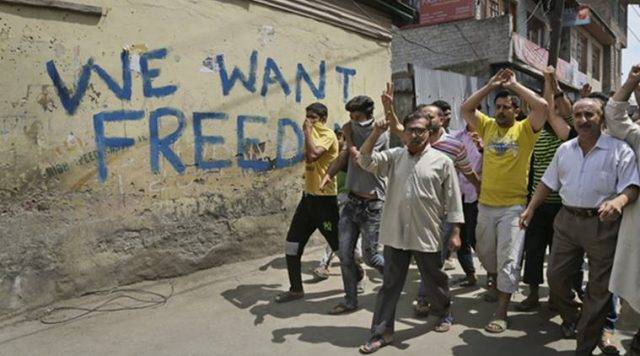
India revoked Kashmir’s special constitutional status on August 5. The move was followed by the imposition of curfew in the occupied valley along with a communication blackout. Though Pakistan’s government has tried to build a consensus about the issue on the international level, it has not found much success as the world is not ready to listen.
There are reasons why Pakistan’s pleas are falling on deaf ears in the major capitals of the world. On the other hand, India’s point of view is being listened to by world leaders mostly because the country had made great strides economically and enjoys strong business ties with all the leading countries of the world.
Journalist Azad Essa recently did an interesting Twitter thread where he linked the situation of Kashmir with the deep-rooted connections between capital, government, intergovernmental organisations, humanitarians, showbiz personalities, and manufacturing of consent. And Ambani wedding of 2019 is an excellent example of this nexus as explained by Essa.
Mukesh Ambani, the richest man in India, got his daughter married off to a billionaire real estate tycoon. The entire event cost $100 million.
The wedding was attended by important guests from across the globe including, UN Secretary General Ban Ki-Moon, Bollywood stars, Beyonce, Ariana Guffington, Google CEO Sundar Pichai, Microsoft CEO Satya Nadella, Hillary Clinton, Tony Blair, Saudi Arabia’s Energy Minister Khalid Al-Falih, Netflix co-founder Reed Hastings and others.
Many observers believe that these important people are complicit in the furtherance of economic inequality in India where the Ambani brothers sit on top of the economic food chain.
Coming back to the wedding, the mega event is being viewed by many as a PR and advertising campaign to develop consent for the Ambanis to further their business interests and enhancing their local and international image.
So what is the link between the Kashmir issue and the Ambanis? It was recently reported that the Ambanis would send a task team to Kashmir to support Prime Minister Narendra Modi’s call for “development” and “investment” in the occupied valley. Consent for including Ambanis in the grand development scheme had already been developed through different forums.
The Raisina Dialogue, India’s premier geopolitical forum, has long been sponsored by Observer Research Foundation (ORF), which is a public policy think tank started by the Ambanis and being funded by them as well.
According to an ORF insider, “The final tipping point for a decision in government, with a policy which would have huge financial ramifications for a corporation like Reliance, needs ORF. ORF can come in and give that positive twist and final push."
Two days before the revocation of Article 370, an ORF policy brief was issued in support of Modi decision and was meant to create policy consensus for the unconstitutional move. At least five days after the brief, the Ambanis are all set to secure a major chunk of real estate in Kashmir, after Mukesh Ambani spoke about investing in Kashmir and developing the region.
This proves that capital and government are interlinked in a mutually beneficial relationship, irrespective of national or international associations.
There are reasons why Pakistan’s pleas are falling on deaf ears in the major capitals of the world. On the other hand, India’s point of view is being listened to by world leaders mostly because the country had made great strides economically and enjoys strong business ties with all the leading countries of the world.
Journalist Azad Essa recently did an interesting Twitter thread where he linked the situation of Kashmir with the deep-rooted connections between capital, government, intergovernmental organisations, humanitarians, showbiz personalities, and manufacturing of consent. And Ambani wedding of 2019 is an excellent example of this nexus as explained by Essa.
Mukesh Ambani, the richest man in India, got his daughter married off to a billionaire real estate tycoon. The entire event cost $100 million.
The wedding was attended by important guests from across the globe including, UN Secretary General Ban Ki-Moon, Bollywood stars, Beyonce, Ariana Guffington, Google CEO Sundar Pichai, Microsoft CEO Satya Nadella, Hillary Clinton, Tony Blair, Saudi Arabia’s Energy Minister Khalid Al-Falih, Netflix co-founder Reed Hastings and others.
Many observers believe that these important people are complicit in the furtherance of economic inequality in India where the Ambani brothers sit on top of the economic food chain.
Coming back to the wedding, the mega event is being viewed by many as a PR and advertising campaign to develop consent for the Ambanis to further their business interests and enhancing their local and international image.
So what is the link between the Kashmir issue and the Ambanis? It was recently reported that the Ambanis would send a task team to Kashmir to support Prime Minister Narendra Modi’s call for “development” and “investment” in the occupied valley. Consent for including Ambanis in the grand development scheme had already been developed through different forums.
The Raisina Dialogue, India’s premier geopolitical forum, has long been sponsored by Observer Research Foundation (ORF), which is a public policy think tank started by the Ambanis and being funded by them as well.
According to an ORF insider, “The final tipping point for a decision in government, with a policy which would have huge financial ramifications for a corporation like Reliance, needs ORF. ORF can come in and give that positive twist and final push."
Two days before the revocation of Article 370, an ORF policy brief was issued in support of Modi decision and was meant to create policy consensus for the unconstitutional move. At least five days after the brief, the Ambanis are all set to secure a major chunk of real estate in Kashmir, after Mukesh Ambani spoke about investing in Kashmir and developing the region.
This proves that capital and government are interlinked in a mutually beneficial relationship, irrespective of national or international associations.
